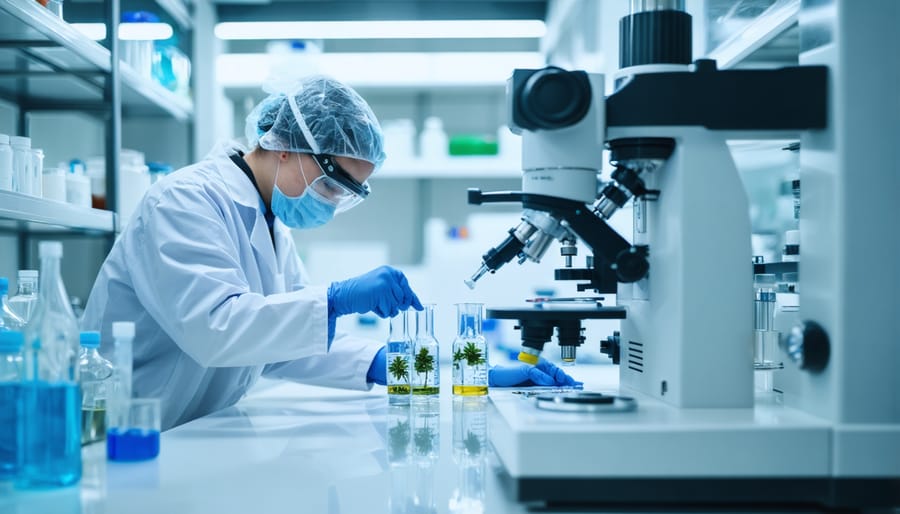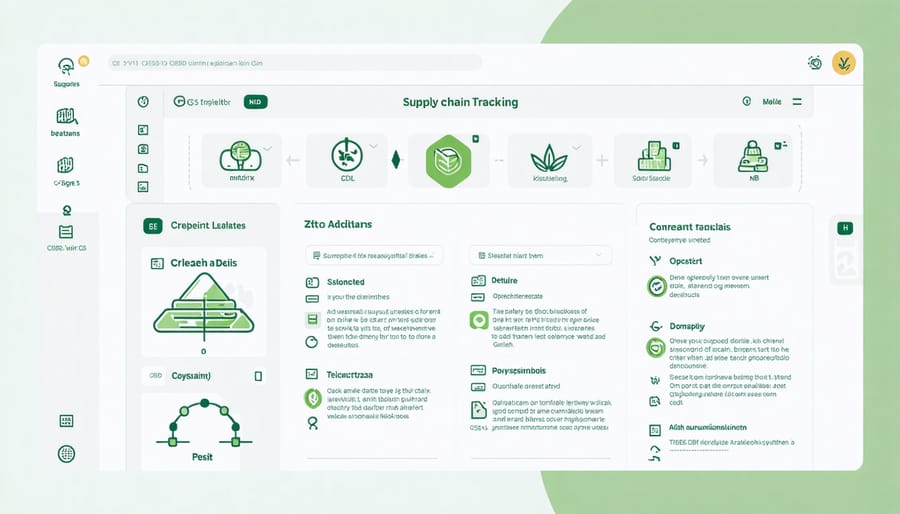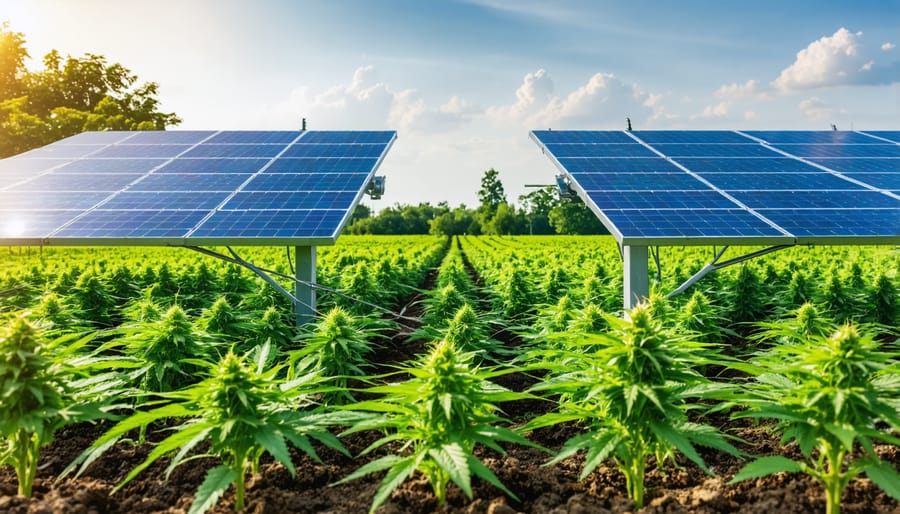Canada’s CBD oil sector stands at the forefront of business innovation, transforming traditional wellness solutions like cbd for sleep canada into cutting-edge commercial opportunities. As Canadian companies leverage advanced extraction technologies and sustainable practices, the industry has evolved into a $5.2 billion market, with projections pointing to 22% annual growth through 2025.
Leading corporations are revolutionizing the CBD landscape through AI-driven cultivation methods, blockchain-based supply chain solutions, and precision dosage technologies. This convergence of biotechnology and business innovation has positioned Canadian enterprises as global pioneers, particularly in pharmaceutical-grade CBD development and specialized medical applications.
The regulatory framework established by Health Canada has created a unique advantage for domestic innovators, enabling controlled experimentation while maintaining strict quality standards. This balanced approach has attracted significant international investment, with venture capital funding in Canadian CBD startups reaching $425 million in 2022 alone.
Corporate leaders are now faced with unprecedented opportunities to shape the future of wellness technology, as emerging research continues to validate CBD’s therapeutic potential across multiple industries.
The Evolution of CBD Business in Canada’s Regulatory Framework
Recent Regulatory Changes
Recent amendments to the Cannabis Act have significantly reshaped the CBD business landscape in Canada. As of 2023, Health Canada has streamlined the licensing process for CBD product manufacturers, reducing approval timelines from 12 months to approximately 6 months. This acceleration has sparked a wave of innovation among Canadian enterprises.
Notable changes include the introduction of the micro-processing license category, enabling smaller businesses to enter the market with reduced compliance burdens. Additionally, new regulations now permit CBD product research and development without requiring a full processing license, fostering innovation in extraction technologies and product formulations.
The government has also updated packaging and labeling requirements, mandating QR codes that link to detailed product information and third-party lab results. This digital integration enhances transparency and builds consumer trust while creating opportunities for tech-focused solutions in supply chain tracking.
Environmental compliance has become more stringent, with new requirements for sustainable packaging and waste management. Companies must now demonstrate their commitment to reducing environmental impact through documented sustainability practices.
These regulatory shifts have created a more dynamic marketplace while maintaining Canada’s reputation for strict quality control and safety standards. Business leaders should note that further policy evolution is expected as the industry matures and new scientific evidence emerges.
Compliance Innovation Opportunities
Canadian CBD businesses are pioneering innovative approaches to compliance while maintaining competitive advantages. Leading companies are implementing blockchain-based tracking systems to ensure transparency throughout the supply chain, from cultivation to retail distribution. This technology enables real-time verification of product origins and testing results, satisfying Health Canada’s stringent requirements while streamlining operations.
Several firms have developed proprietary software solutions that integrate compliance monitoring with inventory management, automatically flagging potential regulatory issues before they become problems. These systems help businesses stay ahead of evolving regulations while reducing administrative overhead.
Quality assurance innovations include the adoption of automated testing protocols that ensure consistent CBD concentrations and product purity. Companies are also investing in smart packaging solutions with QR codes that provide consumers instant access to batch-specific lab results and compliance documentation.
Some businesses are forming strategic partnerships with regulatory technology providers to create custom compliance frameworks. These collaborations have resulted in innovative approaches to age verification, product tracking, and documentation management. Additionally, companies are leveraging artificial intelligence to monitor regulatory changes and automatically update their compliance procedures, ensuring they remain current with Canada’s dynamic CBD regulations while maintaining operational efficiency.
Technological Breakthroughs in CBD Oil Production

Sustainable Extraction Methods
Canadian CBD producers are revolutionizing the industry through innovative extraction technologies that prioritize environmental sustainability while maintaining product quality. Leading companies have implemented closed-loop extraction systems that reduce waste and energy consumption by up to 90% compared to traditional methods.
These advanced processes incorporate biomass recycling, water conservation measures, and renewable energy sources. For instance, British Columbia-based processors have pioneered solar-powered extraction facilities, while Alberta operations utilize geothermal energy to power their production lines.
Supercritical CO2 extraction, increasingly adopted across the country, eliminates the need for harmful solvents while allowing for CO2 recapture and reuse. This method not only minimizes environmental impact but also ensures a cleaner final product for consumers.
Several Canadian firms have developed proprietary systems that integrate artificial intelligence to optimize extraction efficiency and reduce resource consumption. These smart systems continuously monitor and adjust parameters, resulting in up to 25% less energy usage while maintaining consistent output quality.
Industry leaders are also implementing blockchain technology to track their environmental impact, providing unprecedented transparency in resource utilization and carbon footprint measurements. This commitment to sustainable practices positions Canadian CBD producers at the forefront of global green innovation while meeting growing market demands for environmentally responsible products.
Quality Control Technologies
Canadian CBD oil producers are leveraging cutting-edge quality control technologies to maintain product excellence and compliance. Advanced chromatography systems, specifically High-Performance Liquid Chromatography (HPLC) and Mass Spectrometry, enable precise cannabinoid profiling and contaminant detection. These biotechnology innovations have revolutionized testing accuracy and efficiency.
Blockchain-based verification systems are gaining traction, allowing companies to track CBD products from seed to sale. This technology ensures transparency and authenticity while meeting regulatory requirements. Several Canadian laboratories have implemented artificial intelligence-powered testing protocols that can identify over 400 potential contaminants in under 48 hours.
Real-time monitoring systems using IoT sensors now facilitate continuous quality assessment throughout the production process. These systems track environmental conditions, extraction parameters, and storage conditions, ensuring consistent product quality. Additionally, spectroscopic analysis techniques provide rapid, non-destructive testing options for routine quality checks.
Leading Canadian firms have developed proprietary testing algorithms that combine multiple analytical methods, creating comprehensive quality profiles for each batch. This multi-parameter approach has significantly reduced false positives and enhanced detection accuracy. The integration of cloud-based quality management systems enables real-time data sharing between facilities, laboratories, and regulatory bodies, streamlining compliance reporting and certification processes.
Market Integration and Supply Chain Innovation
Digital Supply Chain Solutions
Canadian CBD oil companies are revolutionizing their operations through sophisticated digital supply chain solutions. Leading firms have implemented blockchain-based tracking systems that monitor products from seed to sale, ensuring transparency and compliance with Health Canada regulations. These systems provide real-time inventory management while maintaining detailed records of cultivation, extraction, and distribution processes.
Cloud-based platforms have become instrumental in optimizing warehouse operations and distribution networks. Companies like Aurora Cannabis and Canopy Growth utilize AI-powered demand forecasting to prevent stockouts and maintain optimal inventory levels. Smart sensors monitor storage conditions, automatically adjusting temperature and humidity to preserve product quality.
Integration of IoT devices throughout the supply chain enables precise monitoring of transportation conditions, crucial for maintaining CBD oil stability. Advanced analytics tools help companies identify bottlenecks, reduce waste, and improve delivery efficiency. Several mid-sized producers have reported 30% reduction in operational costs after implementing these digital solutions.
Mobile applications now connect retailers directly with distribution centers, enabling real-time order processing and routing optimization. This digital transformation has particularly benefited remote communities, where inventory management previously posed significant challenges. As the industry matures, these technological solutions are becoming increasingly sophisticated, incorporating predictive maintenance and automated quality assurance protocols.

Cross-Industry Partnerships
Strategic collaborations across industries are revolutionizing Canada’s CBD oil sector, creating unprecedented opportunities for innovation and market expansion. Leading pharmaceutical companies are partnering with agricultural technology firms to develop enhanced extraction methods and standardized product formulations. Notable examples include the alliance between Vancouver-based Aurora Cannabis and wellness retailer Shoppers Drug Mart, which has streamlined CBD product distribution nationwide.
Tech startups are also joining forces with established CBD producers to implement blockchain solutions for supply chain transparency and product authentication. This integration has particularly benefited smaller producers by providing access to sophisticated tracking systems previously available only to larger corporations.
The cosmetics industry has emerged as a key collaboration partner, with Canadian skincare brands incorporating CBD innovations into their product lines. These partnerships have led to the development of novel delivery systems and improved bioavailability in topical applications.
Research institutions are playing a pivotal role, with universities like McGill and Toronto forming industry partnerships to conduct clinical trials and develop new applications. These collaborations have accelerated the pace of innovation while ensuring rigorous scientific validation of CBD products.
Healthcare providers and wellness centers are increasingly partnering with CBD producers to create specialized treatment protocols, establishing new standards for medical cannabis applications in clinical settings.

Environmental Impact and Sustainability
Canadian CBD producers are increasingly prioritizing environmental stewardship, recognizing that sustainable practices not only benefit the planet but also resonate with conscious consumers. Leading companies have adopted sustainable agricultural practices that minimize water usage and reduce soil degradation while maintaining high-quality CBD extraction.
Many producers have implemented closed-loop extraction systems that recycle solvents and minimize waste, significantly reducing their environmental footprint. These systems typically recover up to 95% of the ethanol used in extraction, demonstrating both ecological responsibility and operational efficiency. Forward-thinking companies are also investing in renewable energy solutions to power their facilities, with solar and wind installations becoming increasingly common across cultivation sites.
Packaging innovation has emerged as another crucial area of environmental focus. Industry leaders are transitioning to biodegradable materials and implementing recycling programs for containers and shipping materials. Some companies have pioneered hemp-based packaging solutions, creating a circular economy within the industry itself.
Water conservation technologies have gained significant traction, with automated irrigation systems and water reclamation projects reducing consumption by up to 40% compared to traditional cultivation methods. Several Canadian producers have also adopted organic farming practices, eliminating synthetic pesticides and fertilizers while promoting soil health through natural amendments and crop rotation.
The industry’s commitment to sustainability extends to supply chain management, with many companies prioritizing local sourcing and establishing partnerships with environmentally conscious suppliers. This approach not only reduces transportation-related emissions but also supports regional economic development.
These environmental initiatives are increasingly becoming a competitive advantage, as institutional investors and consumers alike gravitate toward companies demonstrating genuine commitment to sustainability. The integration of these practices positions Canadian CBD producers at the forefront of responsible innovation in the global cannabis industry.
Future Outlook and Investment Opportunities
The Canadian CBD oil industry stands at the cusp of significant transformation, with projections indicating a compound annual growth rate of 25% through 2026. This remarkable trajectory is driven by several emerging trends that present compelling investment opportunities for forward-thinking business leaders.
Personalized wellness solutions represent one of the most promising growth areas, with CBD manufacturers increasingly focusing on custom formulations and targeted therapeutic applications. This shift towards personalization is expected to create new market segments and revenue streams for innovative companies.
Technology integration is becoming a crucial differentiator, with blockchain-powered supply chain solutions and AI-driven product development leading the way. Smart manufacturing facilities incorporating automation and IoT sensors are expected to become the industry standard, offering opportunities for both technology providers and CBD producers to collaborate and innovate.
The emergence of CBD-infused functional foods and beverages presents another significant growth vector. Market research indicates that Canadian consumers are increasingly seeking wellness products that seamlessly integrate into their daily routines, creating opportunities for strategic partnerships between CBD producers and established food and beverage companies.
International export opportunities are expanding as more countries liberalize their CBD regulations. Canadian companies with established quality control systems and compliance frameworks are well-positioned to capitalize on these emerging markets, particularly in Europe and Latin America.
Research and development investments in synthetic CBD production could revolutionize the industry, potentially reducing production costs while increasing consistency and scalability. This area presents significant opportunities for biotechnology companies and traditional CBD producers to forge innovative partnerships.
However, success in these areas requires careful consideration of regulatory evolution, market dynamics, and consumer preferences. Companies that can balance innovation with compliance while maintaining strong environmental, social, and governance (ESG) practices are likely to emerge as industry leaders in this rapidly evolving sector.
Canada’s CBD oil industry stands at the forefront of business innovation, driven by technological advancements and strategic partnerships. From automated extraction processes to blockchain-enabled supply chain solutions, Canadian companies continue to push boundaries while maintaining strict quality standards. The integration of AI-powered cultivation systems and sustainable practices demonstrates the sector’s commitment to responsible growth. Looking ahead, the industry is poised for further transformation through emerging technologies like nanoemulsion and bioavailability enhancements. As global markets expand, Canadian businesses are well-positioned to lead with their innovative approaches, regulatory compliance, and commitment to sustainability. The future promises continued evolution in product development, delivery methods, and consumer-focused solutions, cementing Canada’s position as a global leader in CBD innovation.

